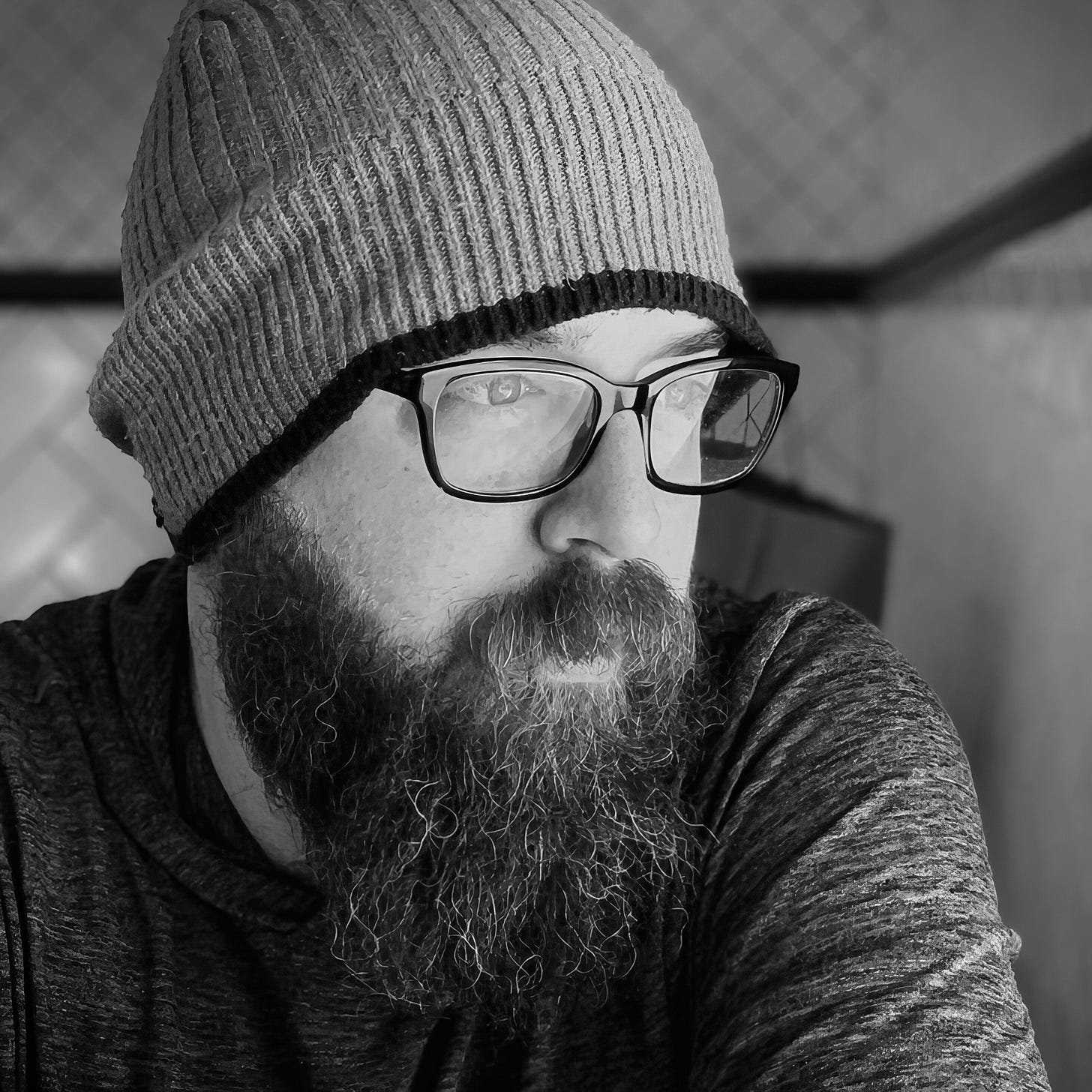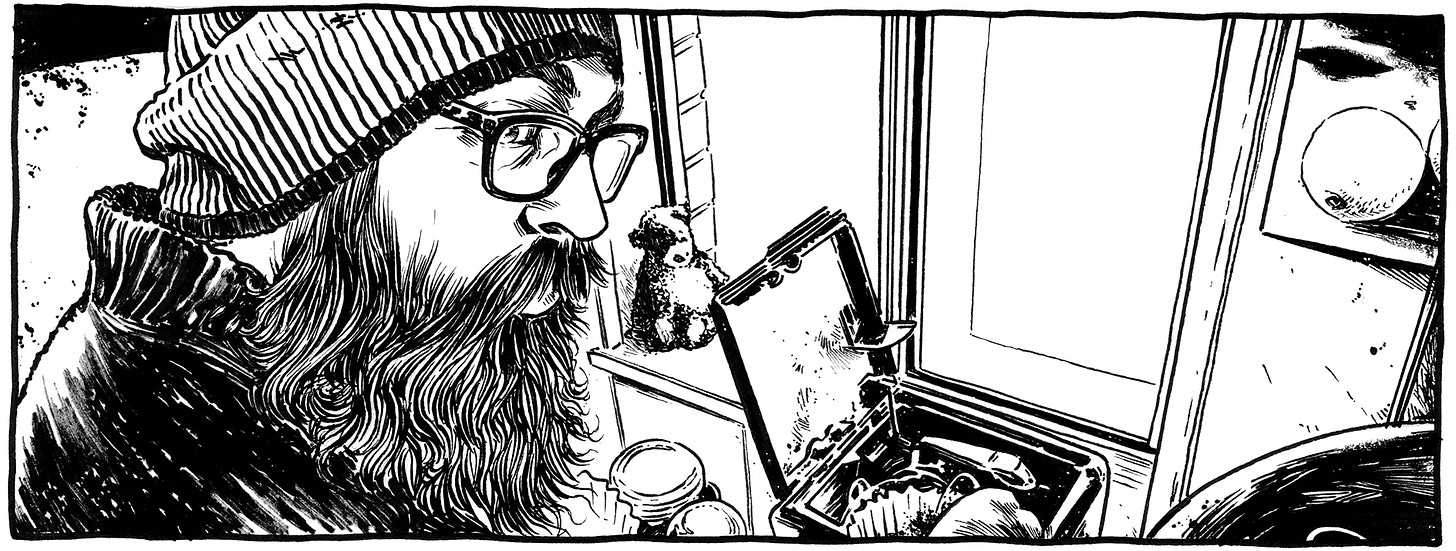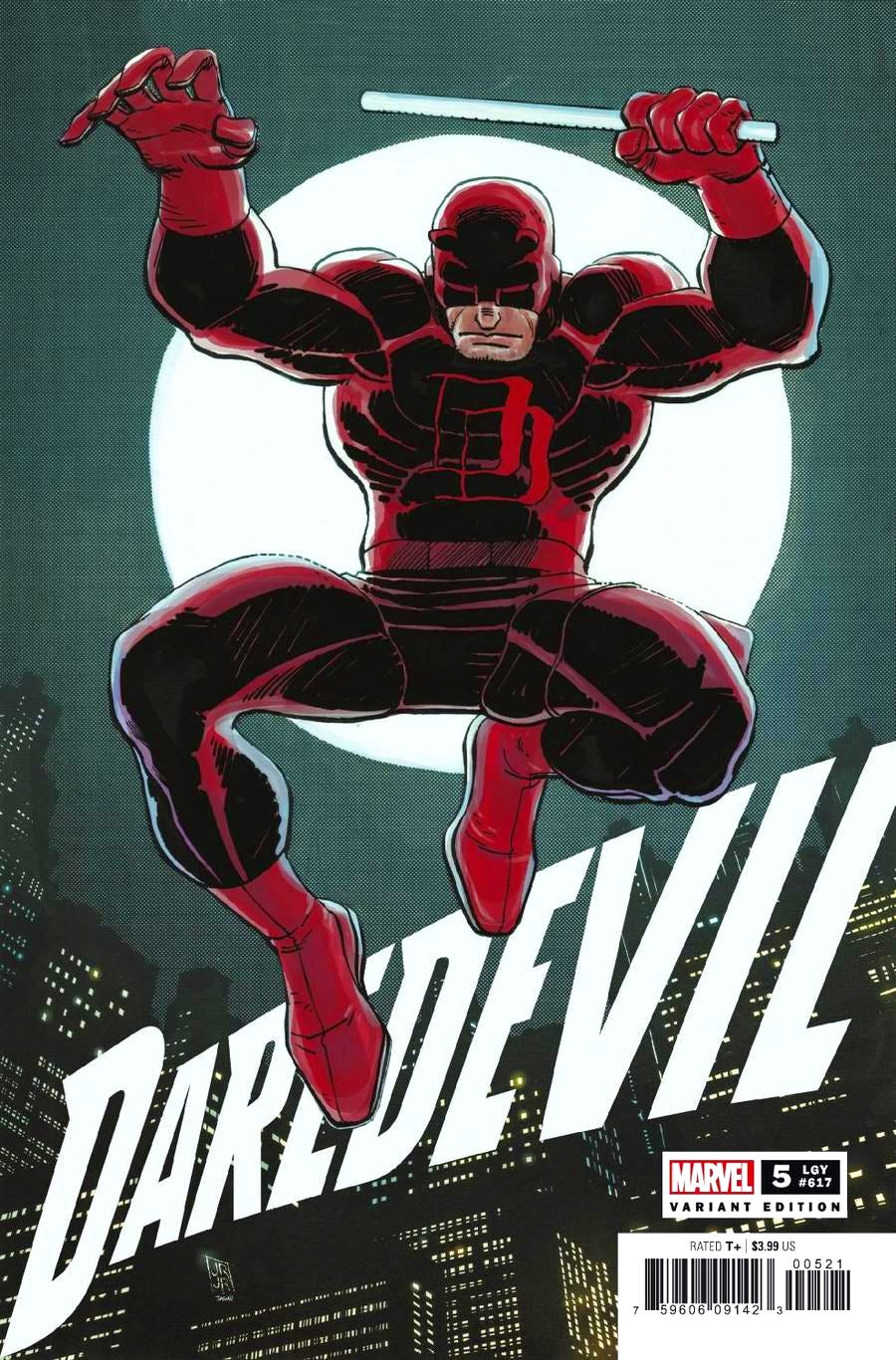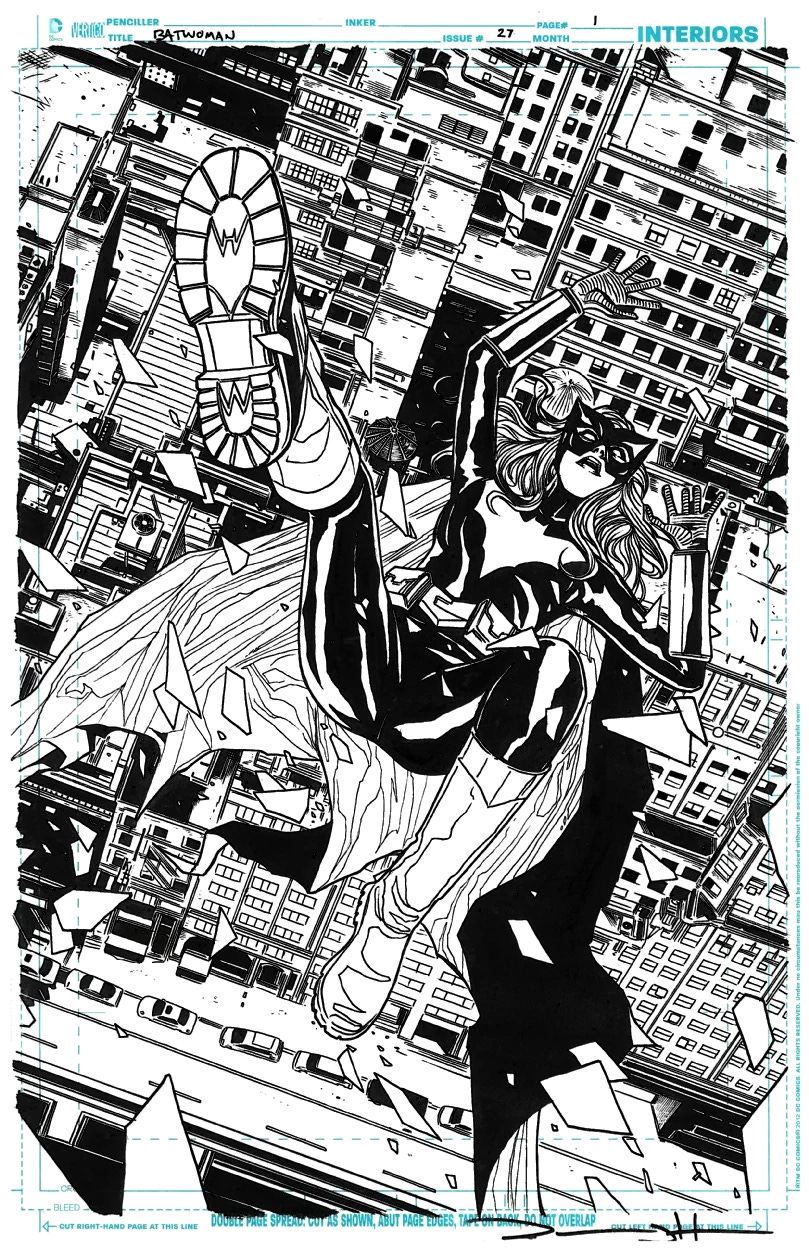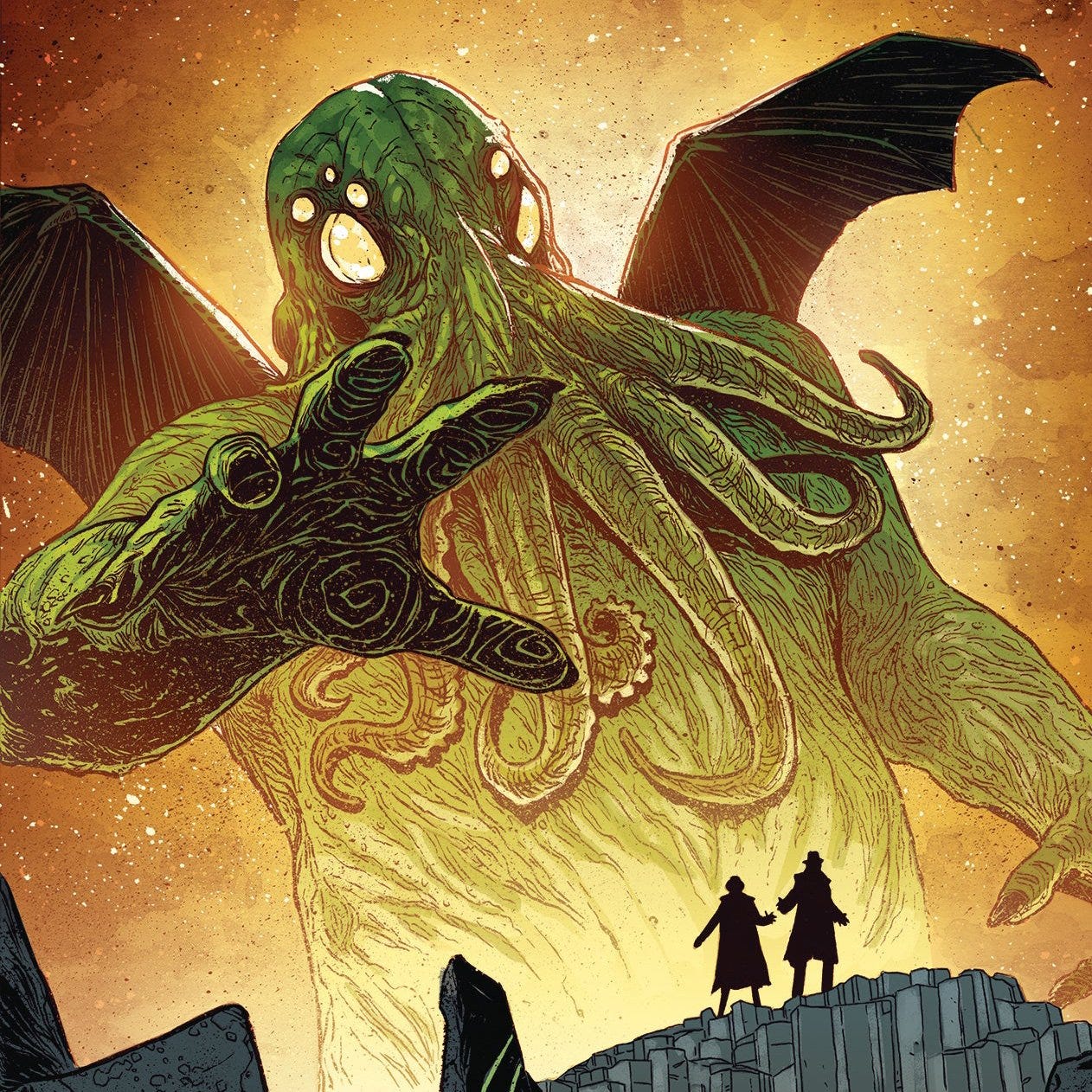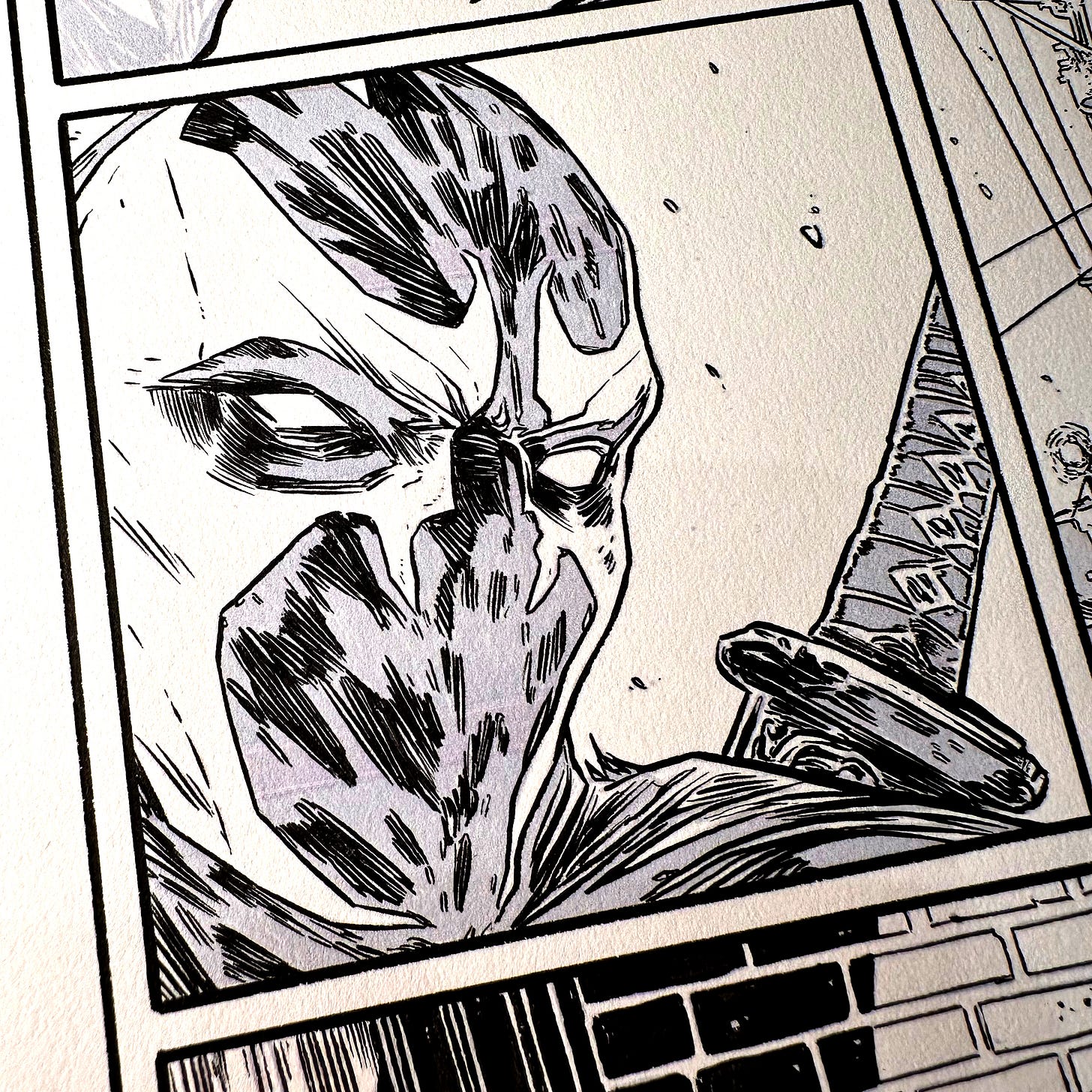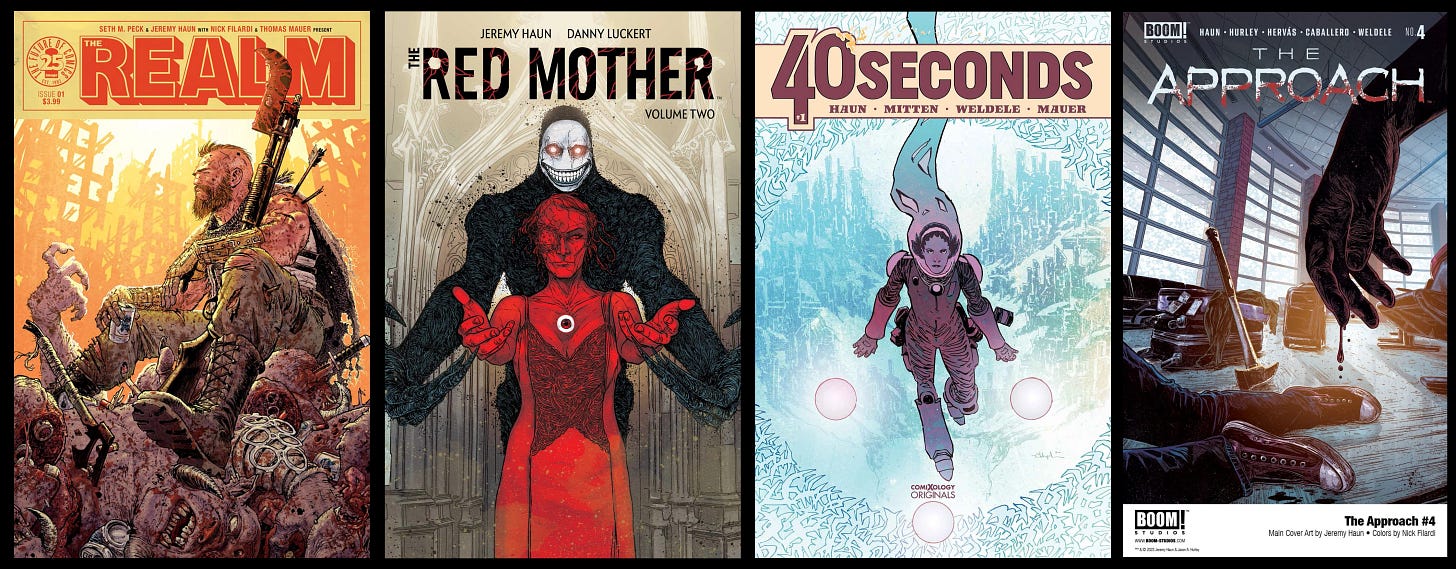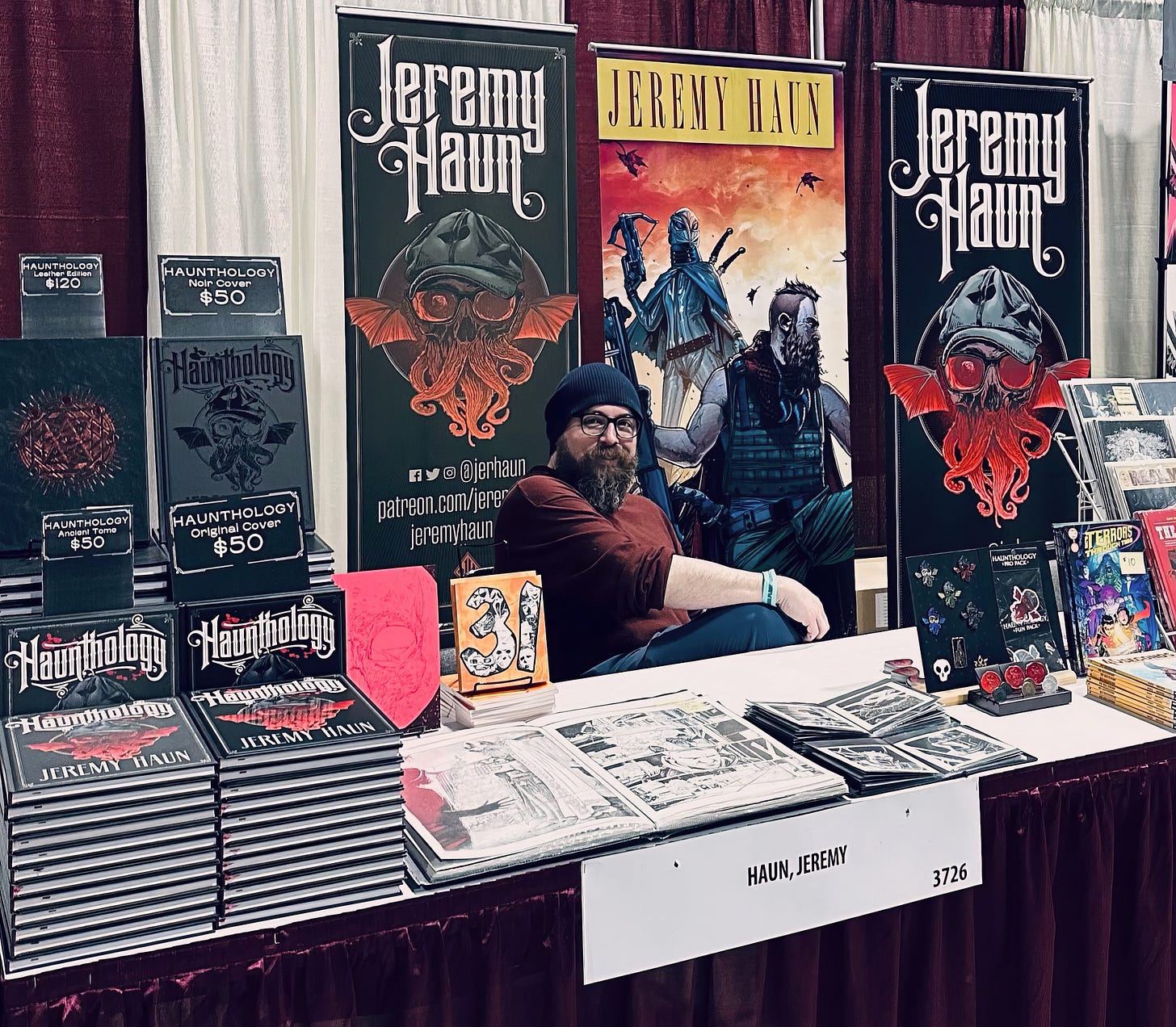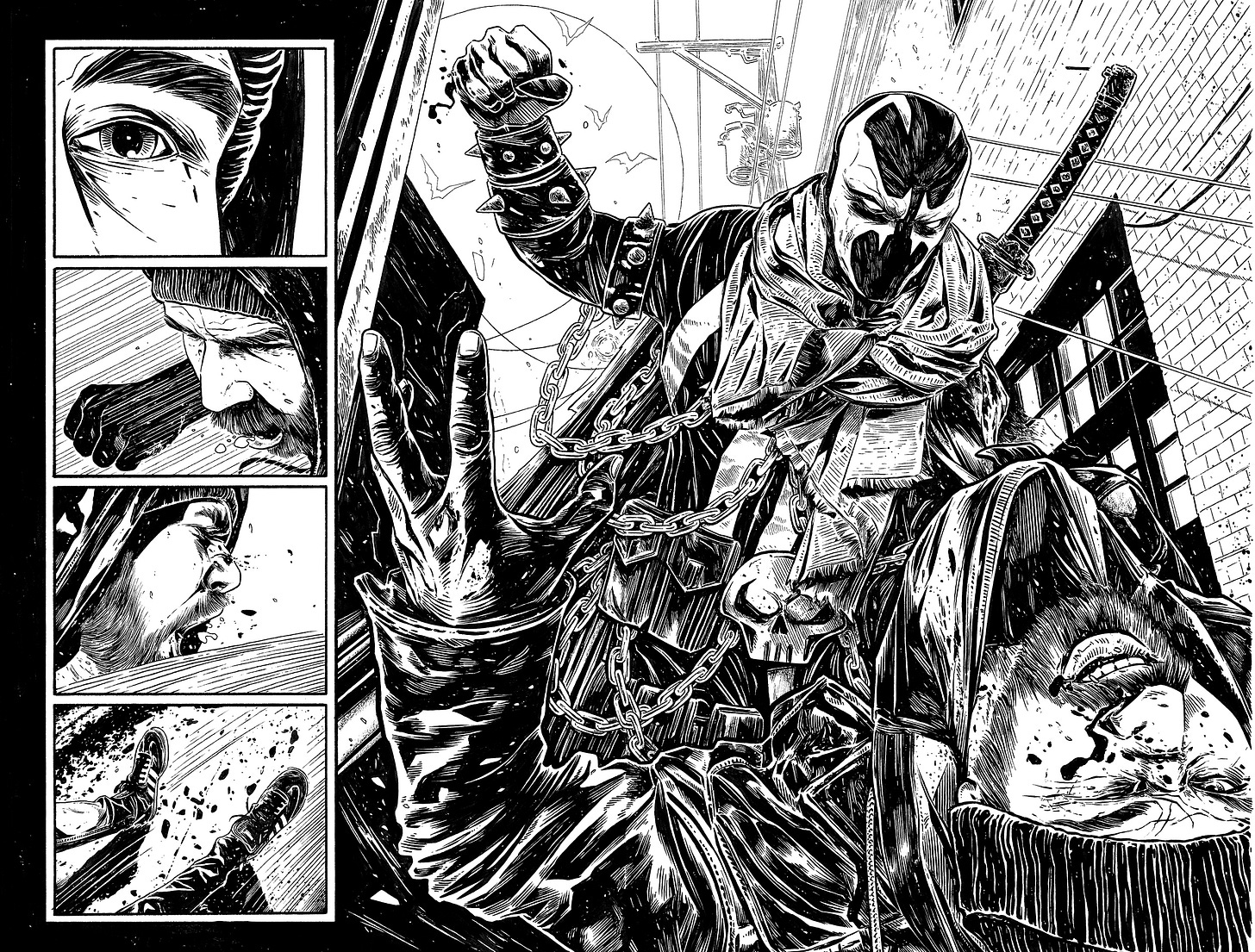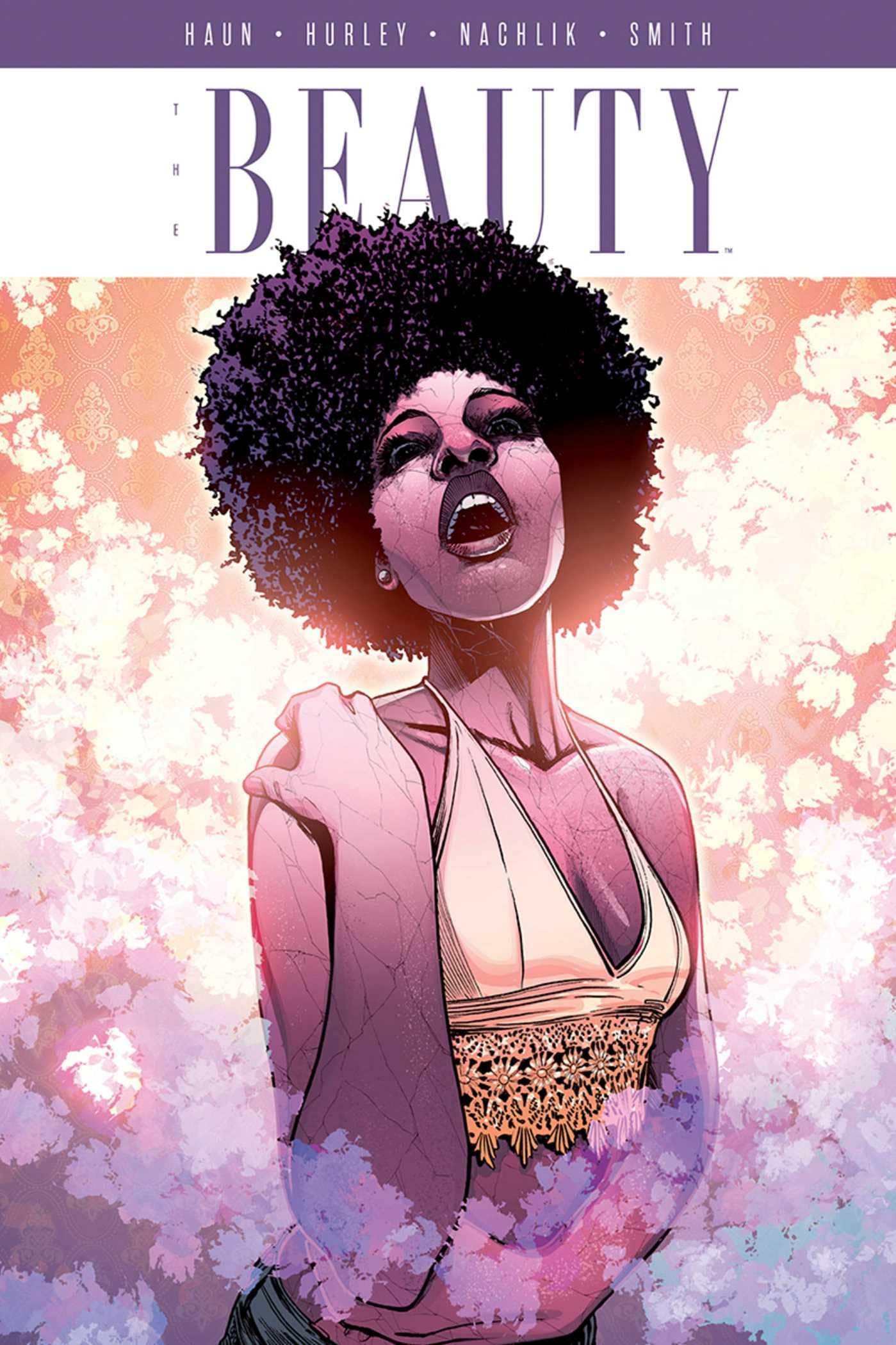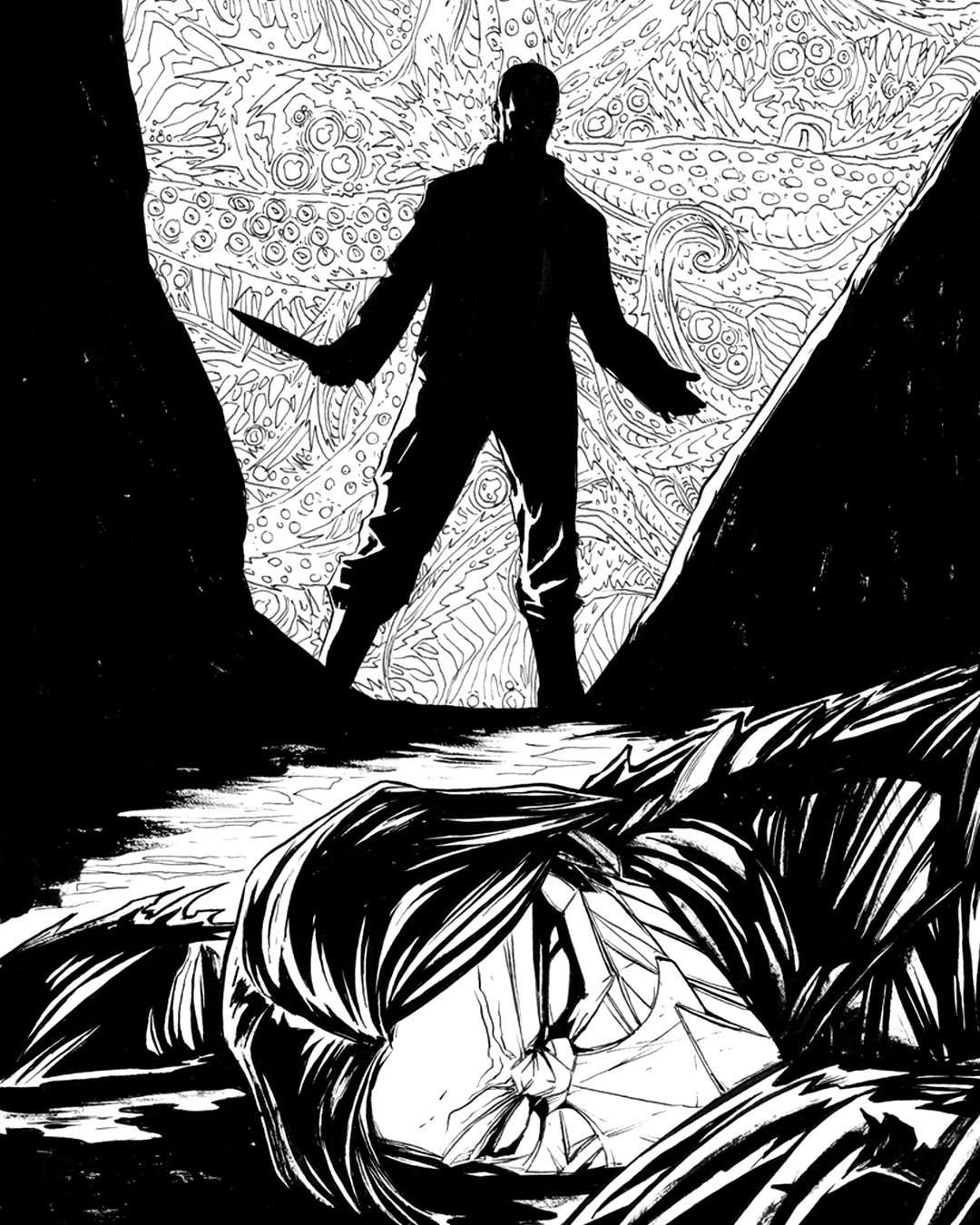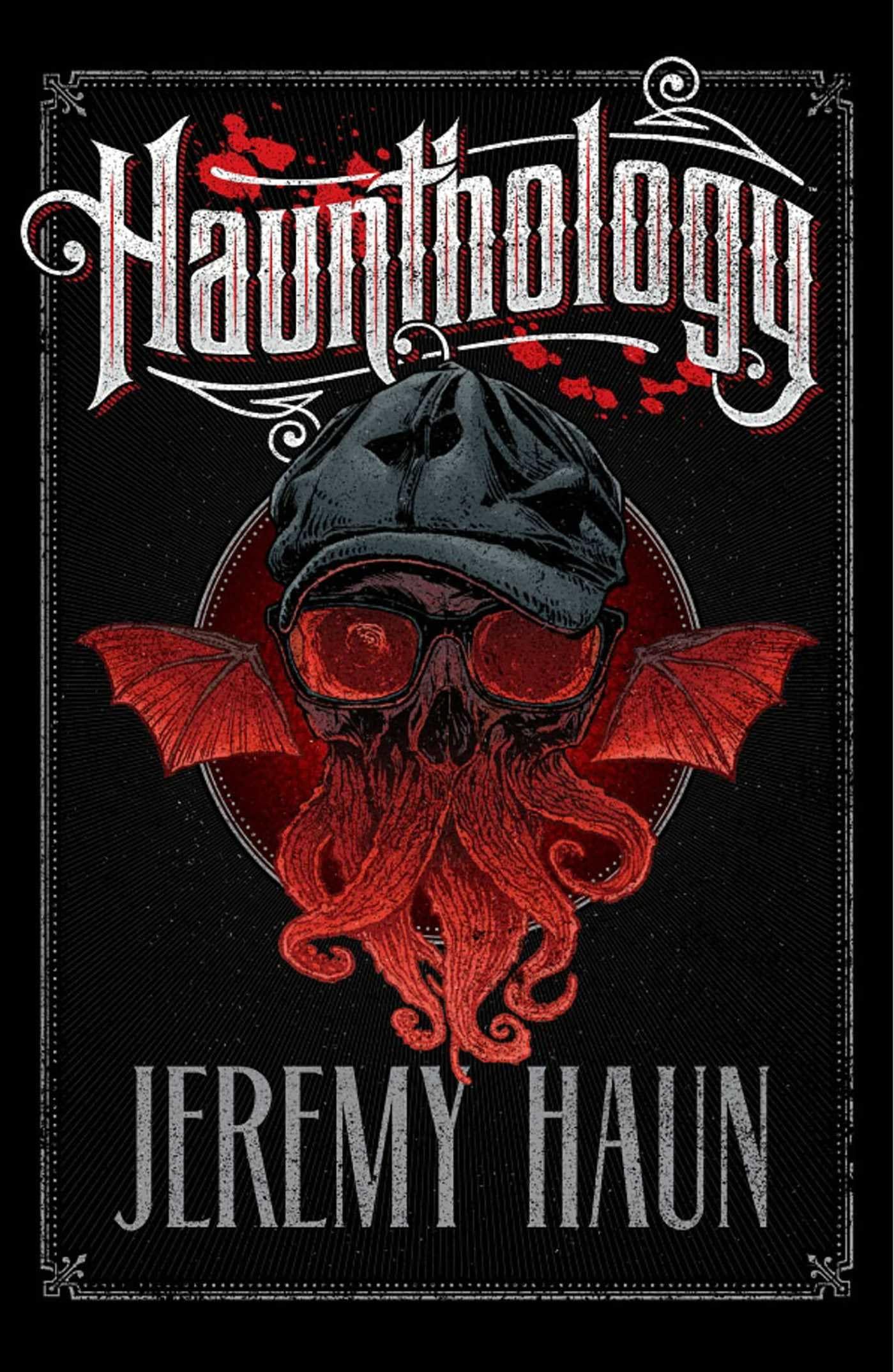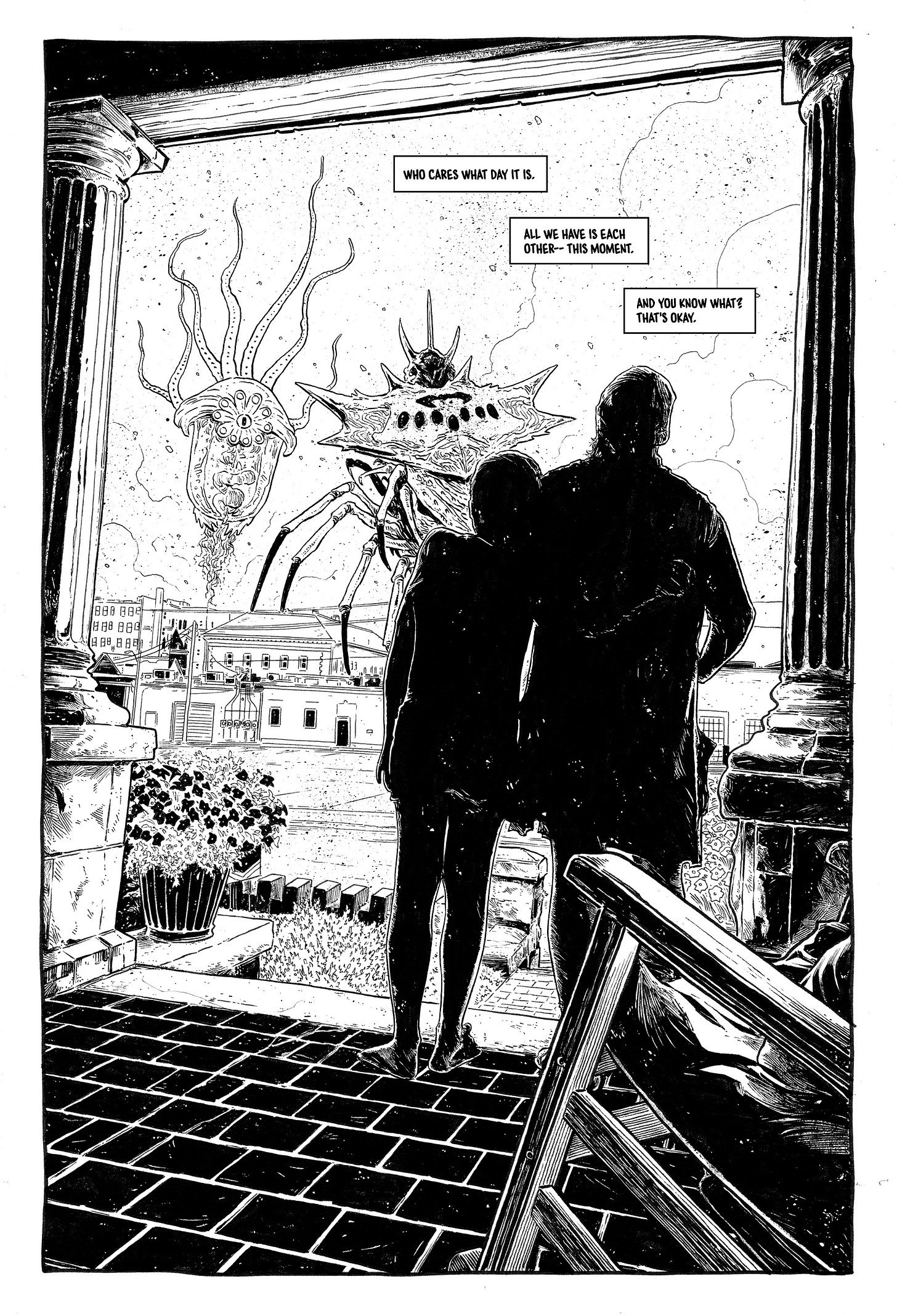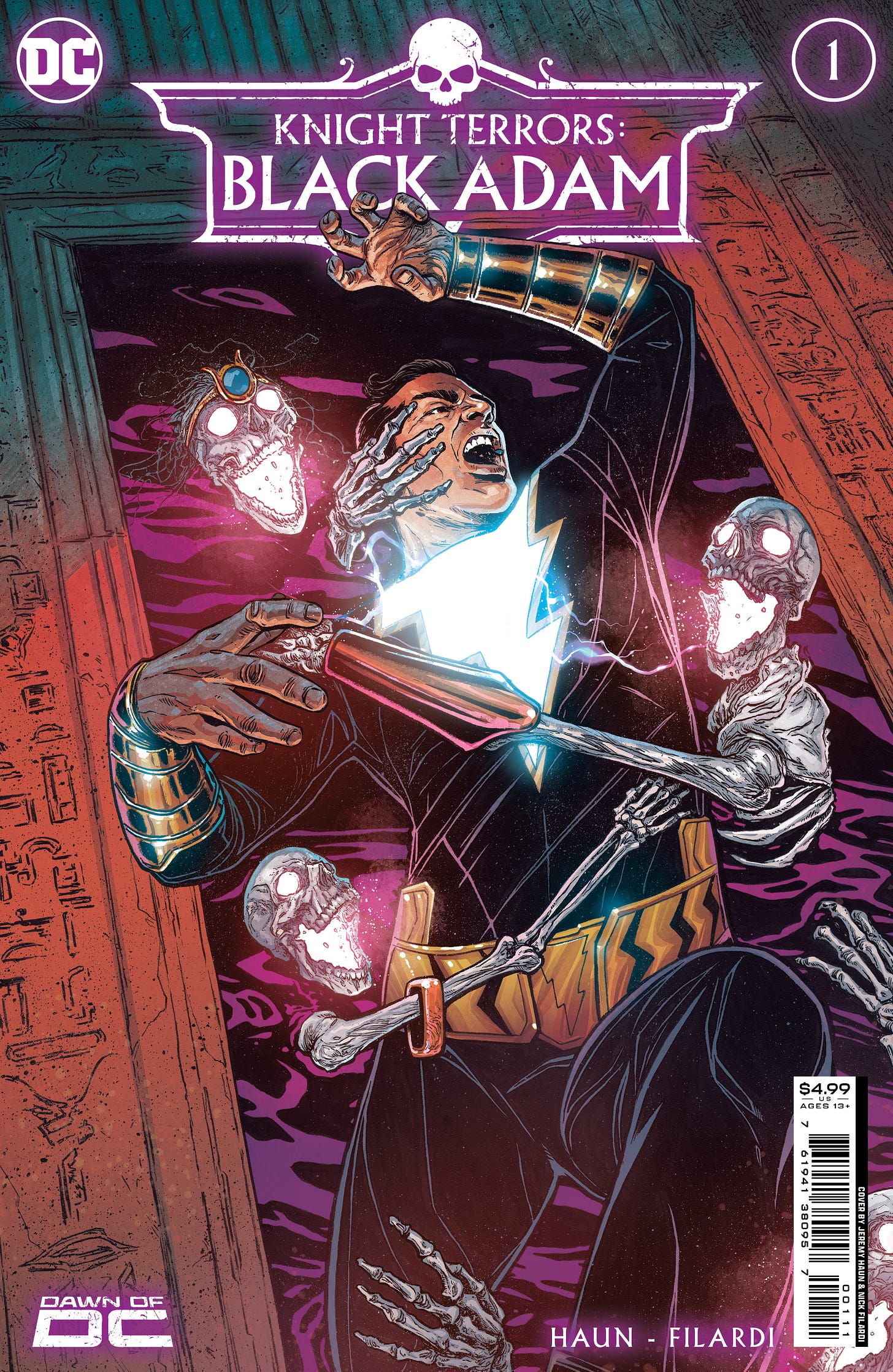Long Story Short ★ JEREMY HAUN
"I'm a storyteller. I... maybe pretty foolishly never allowed myself a backup plan."
Welcome to the Premium Edition of LONG STORY SHORT where we dive deeper into our conversations with storytelling creatives from a wide variety of industries. If you’re currently not a paid subscriber, check out the in-depth interviews like this that you’re currently missing. Also…there are ARTICLES, TUTORIALS, VIDEOS, and MORE that could be incredibly helpful to you and your career for as little as a cup of coffee per month. So please consider helping us help you by joining our ever-growing community today.
This month we talk with a real salt-of-the-earth creator, JEREMY HAUN. His comic works include, The Realm, Haunthology, The Beauty, Batman, Red Hood, Batwoman, Iron Man, and so much more. What makes Jeremy interesting is his innovation, his dedication, and his consistency to deliver on his vision.
There’s a lot to learn here…even how he goes about his process.
BTP: As a card-carrying member of the DIY generation, how do you think your upbringing shaped the hustle and flow of your career? Where do you think that level of perseverance came from?
HAUN: I grew up on a farm. My grandparents were lovely people, but we worked hard. I realize that sounds a bit like the opening to one of those "In my day we walked school in the snow, up hill, both ways!" stories, but it was true. We worked long hours on the farm, regardless of the weather or anything else. If something needed done...you just had to do it. If we didn't know how to fix a tractor, we had to figure it out. I feel like a lot of that carried over into my comics work. I came up in a time where tutorials on things were rare. If I wanted to learn how to make these comics, I had to dig up whatever information I could, probably fail a bit, but ultimately figure it out.
It also helps that I genuinely like making things. Doesn't matter if it's a comic series, working to restore an old building, or building a company.
And yeah-- I think a lot of that comes from growing up on that farm.
BTP: I hear that. Sounds like we had some similarities in terms of our surroundings. I think the difference with our generation is we had no choice but to try and fail. There was no other way of learning. I don’t know about you, but it seemed like the hard lesson was that striving for some semblance of perfection took time, discipline, and study.
HAUN: Maybe not always knowing helped a bit too. We had comics themselves and stuff like WIZARD magazine came along to give us a bit of guidance, but other than that...there just wasn't much. We had no real idea if any of this stuff worked or not. Sure, it would've been amazing to have YouTube tutorials help explain things. But we just had to make the things and see what happened.
BTP: Influences change over time as we grow and mature. Early in our careers we tend to find our way through other people’s approaches. Did that happen to you and at what point and on what project do you feel you had found your voice? Was there a eureka moment?
HAUN: You're right. Growing up, we learn so much from the artists we admire.
I was a kid of the late 80s early 90s. I just loved comics. Early on I was obsessed with folks like Walt Simonson, John Romita JR (especially that DAREDEVIL stuff), and Art Adams. Somewhere in there I also found Frazetta and Bernie Wrightson and fell in love with what they were doing. Frank Miller started doing SIN CITY and Mike Mignola (who's stuff I was always incredibly intrigued by) started doing HELLBOY.
Around that same time, guys like Todd McFarlane, Jim Lee, Marc Silvestri, and the rest came on the scene. They absolutely melted my brain. These creators obviously loved all of the same creators that I did, took that influence and did their own thing. The IMAGE boom hit at the perfect time for me. I loved everything that came before, but I wanted to BE those guys.
By the time I finished high school (and had fully decided that I wanted to make comics myself...much to my mother's confusion) the industry had shifted a bit. New, brilliant folks like Mike Wieringo, Humberto Ramos, and Joe Madureira hit the scene.
Back in those days, my art was a weird mix of a lot of what had come before. I was probably some kind of bizarre Frank Miller/John Romita JR/Todd McFarlane/Frank Frazetta mash up. My comics friends from the local shop kept showing me guys like Wieringo and Joe Mad, saying "You've gotta draw like THESE GUYS! They're super-hot right now!"
I loved what those guys were doing too. And if this was where comics were going...I thought I should try and draw like that. I was young and impressionable-- so I tried. I sort of did that thing for a few years. I could kind of ape that style. But...I was just a pale impression of them.
I had this life drawing teacher at the time. He saw my comics stuff and was always really supportive of it. But one day, he pointed to some of the life drawing stuff and said-- "You know...this is how you draw. I see what you're trying to do with the comics, but this is YOU."
That stuck with me. I started trying to figure out who I was and wanted to be creatively.
And this silly way that I draw came from that.
BTP: Now I kind of want to see your early stuff! Was this drawing teacher in college? How important was your education to your art and where you are today?
HAUN: Oh, it was all pretty bad. Still-- there was a charm to it. I was figuring stuff out. I'm sure some of it is still buried in my attic somewhere. This was a professor at the small local college (it later became a full University). I was fortunate enough to receive a nice scholarship to go to college. The program I was in was small, and to be honest, they didn't really know what to do with a kid that wanted to draw comic books. Still, I learned a lot of fundamentals. I also found myself drawing pretty much all day every day. Everything builds on itself to get us where we are. I'm grateful to have had the opportunity to learn from that time.
BTP: Outside of artists, in general, who do you think are some of the best storytellers that have influenced how you approach your own work? What are the key take-aways that you’ve relied upon time and again?
HAUN: As much as we all want to be some kind of absolutely beloved "Artist's Artist", that was never me. I was always more interested in storytelling. I think that's a big part of me being both a writer and artist. They work together. Sure, I love a brilliant single image-- that cover that just knocks your socks off. But for me it's all about the story itself. When It comes to storytelling, I'm always drawn to folks like Joe Kubert, Alex Toth, Mike Mignola, Jamie Hernandez, David Mazzucchelli, and of course Will Eisner. Others too, of course. There are plenty of folks doing it really well to this day. I love examining how different artists tell a story-- how they play with moments and time in comics. It's fascinating.
BTP: Were there other people beyond comics perhaps that inspired your journey?
HAUN: Oh, of course. As much as I've always been fascinated by comics, movies have been just as much an inspiration to me. I remember being pretty young and trying to draw my favorite films as comics. They weren't elaborate, full fleshed out comics, by any means, but I definitely remember drawing moments like Luke Skywalker losing his hand in THE EMPIRE STRIKES BACK. As I got older, I spent a lot of time thinking about how different...yet also similar the film and comics mediums are.
Filmmakers like Steven Spielberg, Stanley Kubrick, Wes Anderson, David Lynch, David Fincher, and Quentin Tarantino have had a big impact on my visual storytelling. Hell-- there are even a lot of bad horror films that have inspired how I tell stories.
BTP: Because your work is reference-heavy can you walk us through the steps in your process from when you have a finished manuscript to when you’re inking? If I remember correctly you’ve incorporated more digital over the years for greater mobility. Is that right?
HAUN: I always wanted to be the kind of artist that perfectly remembers how to draw everything. I'm sort of obsessed with details. It's a bit silly, but I love all of the complex shapes of architecture and whatnot. That same professor that I mentioned earlier used a lot of reference in his own work. He'd draw these elaborate illustrations of trains and cityscapes. This was the mid-nineties, so he had filing cabinets of reference-- a proper morgue. I took a lot of what he was doing and adopted it to get the effect I was wanting.
Of course-- the trick is always using the ref to a point and then doing your own thing. That takes some real time and doing. Over the years my process has changed a lot. I still have a reference morgue (I literally take pictures of ANYTHING that looks cool), but I also take a lot of reference of friends and family, when I can coerce them into doing so. I generally take a script that I get, and thumbnail it out pretty tightly. I get the angles, storytelling, and emotion down in those initial sketches. I used to do that on paper and then scan it in... but nowadays I just do it on the iPad. It's faster. And I HATE scanning.
From there I take those thumbnails/layouts and figure out any reference I need. I break things down into locations, figures, and other elements. If it's a scene that takes place in New York, I pull up my reference morgue of thousands and thousands of photos of the city that I've taken over the years. I see what I have that works. If it's a scene with a person in it, I get a friend to swing by and let me take a few shots of them kicking or whatever. My kids have grown up with it and are absolutely used to me asking them to come out and look like they're punching something or hanging from a grappling line.
Once I have everything compiled as much as possible, I start penciling. I used to do it all physically, but moved to penciling digitally on the iPad, using Clip Studio Paint a few years ago. As long as you're careful about it, being able to zoom way in and infinite undo are your friends, folks!
After everything is penciled (probably still too tightly...because I'm ridiculous), I print them out as bluelines at full 11x17 on art board and go to work on my favorite part-- the inks. Inking for me is just sheer fun. I predominantly use a Hunt 102 Crow Quill for my inks. Why? Because I like it, and in spite of being told the ONLY way to ink was with a brush, I can't make a damned brush do what the hell I want it to. I also use a mess of brush pens, Micron liners, toothbrushes for splatter, and even black colored pencils to get the effect I want.
Everyone has a process. Mine has developed as a way for me to tell the story as comfortably and clearly as possible. While-- you know-- still having as much fun along the way as possible.
BTP: I like seeing the through-line from your professor to now. It’s interesting how guidance starts like a seed and can become a sequoia over one’s lifetime.
HAUN: Oh, absolutely. I was always lucky to have interesting, inspiring art teachers. I owe quite a bit to those men and women seeing a little something in me, over the years.
BTP: There seems to be this unwavering quality that suggests you have a hidden gear, a jolt of nitrous oxide that’ll make the almost impossible become possible. How do you handle that kind of stress when the chips are down? Do you have a support system of peers or an exercise program to help keep you balanced?
HAUN: I wish I could say that it's healthy-- that I had some secret to do it all and still find balance. That'd probably be a lie, though. It's just all determination. I've spent way too many years sitting at that desk pushing myself to the limits to get the work done...somehow. I am lucky to have really wonderful, supportive friends and family to help me through those tough times. I definitely couldn't have done (or continue to do it) without people in my life seeing how hard I have to work and ensuring that I can do so.
BTP: What I admire about you, Jeremy is your ability to establish a vision, whatever it is, comics, making Joplin, Missouri a better place, raising a family, and how you power through to achieve it. What does success look like for you? How have you managed to get so many things across the finish line?
HAUN: Success for me (if it even exists) is comfort.
I grew up without much of anything at all. Anything I wanted, I had to work for. I was just telling a friend about how I've worked constantly since I was twelve years old. I started scraping pig shit and hauling hay on a farm, then went to work as a fry cook at the local Dairy Queen when I was fourteen. After that I worked doing dishes and line work at a fine dining restaurant, before moving on to stocking shelves in grocery stores. I made my way through college working retail, and then finally left a decent gig at a frame shop to start working in comics in my late 20s. I made comics almost all of that time. I'd finish work at the furniture store or frame shop and go home and draw every night for four or five hours. My first REAL paying comics gig came when I was thirty. During all of that time, I just wanted to be comfortable.
There isn't a lot of job security in the comics/entertainment biz. You're only as good as your last gig. Like so many of us, I kind of had to think around it-- make it work for me as best as I could.
As for how I've managed to get so many things across the finish line...it's just about stubbornness...maybe stupidity. Both, maybe? There's kind of a silly thing that I realized about myself. A few years ago, I was working on a big collaborative project. It was a lot. In the midst of it all, I realized that I have a specific, maybe slightly rare ability to persevere through things. I can get shit done...even when the odds are stacked against me.
So how do I do it? Probably a little bit of talent, mixed with an unwavering ability of push forward to get things made.
BTP: On the flipside, what does failure look like for you? What failures have you had and how did you learn from them?
HAUN: Failures happen. Hell-- they happen all the time.
I've had projects that were absolutely locked and running full steam ahead, that then fell apart in the most spectacularly disastrous ways. It's just how it is. You also...just don't really hear so much about those failures. I've always been a "Publically celebrate the wins and privately learn from the losses" kind of person. I get the urge to hop on social media to vent when things don't work. I just don't think it usually does the right thing. I've been at this for a long time, by now. Failures are going to continue to happen. I'm just trying to do my best and go on to the next thing.
BTP: I get it. Failing and succeeding is very much a personal journey. We can learn on the surface from others but once we’re in the throes of it, we’re really on our own.
HAUN: Exactly. And hopefully those failures are at least a bit few and far between.
BTP: The unknown for a lot of people can be fearful as well as things we cannot fully see, like the future for instance. For someone who has produced a lot of horror stories what fears do you have and have you found a way to overcome them?
HAUN: Like a lot of us, my fears all come down to very real-world stuff.
I worry about those I love-- their safety and wellbeing. As creatives, we have this habit of taking a worst-case scenario...and ramping it up to eleven. I've had to really work to not do that in life, though. Especially having kids. I realized that if I let that catastrophizing part of my brain take hold, I'd never be able to let them grow as people...or, you know...have a moment of peace, myself.
BTP: Yeah, exactly. Even though my sister was the one who had kids, I could feel the stress rising in me when she’d tell me what she was dealing with. Because the readers of comics control the pacing of jump-scares and other devices, how have you leveraged sequential art to tell scary stories?
HAUN: For me, the strength of telling scary stories in comics, all comes down to setting a mood. We can kiiiiind of do jump scares, but not the way they can in film. There isn't music building tension. We have to do that solely with images. And that's where the mood comes in. If we do it right, people fill in the scary music for us.
BTP: We’re pushing up against the last quarter of our careers. We’ve seen those who’ve gone before who may or may not still have an audience. It’s something I think about a lot. What does retirement look like for you and how have you planned for it in life and career?
HAUN: I've been thinking a lot about how I have one more major pivot in me. That can be scary, if I let it. But here's the thing...I think it's actually exciting. I've been so fortunate to have this career. I've traveled the world, met amazing people, and lived well beyond what that kid on the farm could've ever expected. ALL because of the goofy, weird stories pinging around in my head.
That's an amazing thing.
As a creative, with this storytelling bug, I don't know that I'm ever going to fully retire. I don't know that I'm going to be sitting at this drawing table quite as much in ten years. But I think the need to create is always going to be there. One of the biggest things I want to focus on in this next phase, aside from telling stories, is working to make comics a better place for us all. We all work so hard at this stuff. I'd like to see a bit more balance to things for everyone.
BTP: Wow, that could be a huge undertaking. Any time I think about American comics getting better I always think about European creatives who seem to have a strong support system in terms of quality, production, and audience consumption. A reading culture that demands just as much quality of their comic books. With American literacy still dismally low, and various book
bans in school libraries (for good or ill), do you think comics can still innovate and continue growing as a viable marketplace for creators and consumers? Do you still think there’s an appetite for creating iconic characters (i.e. Superman, Deadpool, Invincible) or have we moved on to more story-focused comics?
HAUN: I'm not sure that there's any one path forward. There are always challenges to telling stories. It's more about a willingness to innovate. We have to look at what works and what doesn't and build from there.
Same goes with iconic characters/story focused comics. I think people are hungry for both. People love a great iconic character. The story needs to be truly compelling though. I'm never going to shit on a creator for telling a mainstream, icon driven comic. I just want them to be doing it because they truly want to and have something to say about that character.
BTP: If writing and art were not central to your career, what could you have seen yourself doing that would have given you great satisfaction?
HAUN: I don't know that I ever really gave myself that option. I'm a storyteller. I... maybe pretty foolishly never allowed myself a backup plan. Sure, it probably would've been smart to have one. But I always felt like backup plans were for people that gave themselves the option to fail. Damn-- that really sounds like something a know it all twenty-four-year-old would say, doesn't it?
Now, looking back, I feel like I could have applied a lot of the same kinds of skills to cooking or making drinks. I love both. But I'm also glad that I can just be a tourist in those worlds. Those fields are just as, if not MORE brutal than the funny book biz.
BTP: Being a foodie and traveling like you do, I can see how cooking and mixology could be an alt-vocation. I think you could have probably done well at those things, too...plus they’re still creative! Believing in oneself is all well-and-good, especially if you have a track record and a never-say-die attitude. It goes a long way. I think too, we could probably learn to treat ourselves better. What kind of personal growth do you feel comes from being a storytelling of fiction?
HAUN: Fiction definitely lets me examine things on the page. It's not always something that people are going to catch, but I'm often examining a theme from my life (childhood, or whatnot) in a story. HAUNTHOLOGY is one of the best examples of that. It was literally me sitting down and putting my stresses over life during the initial pandemic lockdown on the page.
BTP: I’ve been thinking a lot about legacy lately in terms of “body of work” or influence. What do you think your legacy would be that you leave behind and is it important to you? Have you created what would be considered your seminal work yet?
HAUN: My next thing!
Isn't it always like that? "The NEXT thing is going to be better! More ME! No
compromises!" I both appreciate everything I've done, for the most part, and also always want to do more-- better. As I look back on my body of work, I'm most proud of my creator owned work. There's a throughline to it all-- this connection that I found as I went along. I've been fortunate to tell all the stories that I've told as a writer and artist. The things that matter most to me though are the things that I made from whole cloth.
BTP: I often feel like the work is a dream that keeps slipping through my fingers and if I wake up, I’ll never fully be able to explain it. It’s both ephemeral and frustrating. Still, we continue. Do you feel there’s a personal narrative underneath all of your creator-owned work? Something that you’re trying to solve or discover about yourself?
HAUN: I think there definitely can be! Sometimes a story is an examination on loss and humanity, or the like. Other times...a story can also just be some ridiculous idea about tiny robots fighting inside of someone's body, or whatever. While I think most stories at least have some personal narrative underneath, it's just as possible that someone was just having a laugh.
BTP: After all these years do you think it’s been easier or harder getting your work published, finding collaborators, and creating a solid fanbase?
HAUN: Oh, I don't know. There are always challenges in this weird business. A lot of things have gotten easier, with time. I've built a body of work. People pretty much know what I can do or can look it up pretty easily. I like to think that I've proven myself. Still there are challenges. The industry has changed. There are fewer companies, to a degree. I mean, there are new ones popping up all the time, but that's a whole other thing to navigate. One of the things that has only gotten better over time is my relationship with my fanbase. I'm grateful for that.
The pandemic was hard for us all, but I took the opportunity to work extra hard to foster those relationships. Now that things have opened back up, those relationships have only continued to grow. We all want as big an audience as possible, sure, but give me this group of folks that really care about my work. That's a big part of what keeps me going.
BTP: Finding one’s tribe is huge...even if they’re small to start. It can grow, and it’s not about likes as much as it’s about liking what you say, how you carry yourself, and what you consistently deliver. You’re right, I see a high level of quality in everything you do. The pandemic rocked our social perspective, but you’ve done some pretty crazy stuff to connect with your audiences, too. Driving across country, visiting shops? That sounded like an amazing time.
HAUN: I just like this stuff. I love telling stories. I also love genuinely connecting with fans. And while some people can travel to comic conventions, not everyone can. I try and offer different ways to connect with fans. Things like my newsletter, Patreon, and signing tours have been great ways to connect with my audience.
BTP: I see a lot of well-known creators banding together creating an umbrella in which to publish work. It’s almost like their strength in numbers is a way to weather the storm of uncertainty in the comics industry. I remember working on the Bad Karma anthology with you and it seemed like you guys were headed in that direction. Is that still something that holds interest for you? Any plans in the works?
HAUN: I'm always scheming. I think the trick is finding the right thing. Everyone is working so hard to figure all this out-- what's next. I think there are a lot of possibilities for a group of folks to come together in a way that can be both rewarding and impactful for the industry. We'll just have to see what that ends up being, though.
BTP: Change is the only thing we can count on. It’s a constant, and it’s interesting to see everyone’s version of coping or innovating to work it to their best advantage.
BTP: There’s only so many dollars out there and so many actual readers of comics. In what ways do you think comics could expand the awareness and bring in more eyeballs? Conversely do you feel there’s too much competition when it comes to forms of entertainment as time is now a more diminishing currency?
HAUN: Ultimately people just want cool things. Even with all of the different forms of
entertainment out there, folks are still ravenous for more well told, entertaining stories. The trick, as we move forward, is to figure out how to expand awareness. I think a lot of that is reaching outside of the usual channels and playing to people's interests. We focus so much on the same conventions and audiences. While those are ABSOLUTELY important, I feel like we need to be connecting with horror, sci-fi, and fantasy fans on their own turf. Since so much of my audience is horror based, I want to do more horror conventions in the next couple of years.
BTP: That’s not a bad idea. Planting that seed in other venues may take a couple of cycles to really establish something but that might be worth further investigation. I wish you luck man, you’re definitely one to keep an eye on. Thanks for taking the time, Jeremy, this was really great.
HAUN: Thanks so much. This was a lot of fun.
BTP: Where can people see more of your work and stay connected to any upcoming projects you may have?
HAUN: Like so many of us, I'm on far too many social media platforms. Probably the best way to connect with me is via my website:
That'll link you to all of my other stuff, including my online store, and a sign up for my newsletter. And if you'd like an even deeper dive into my creative world, check out my Patreon-- https://patreon.com/jeremyhaun .



